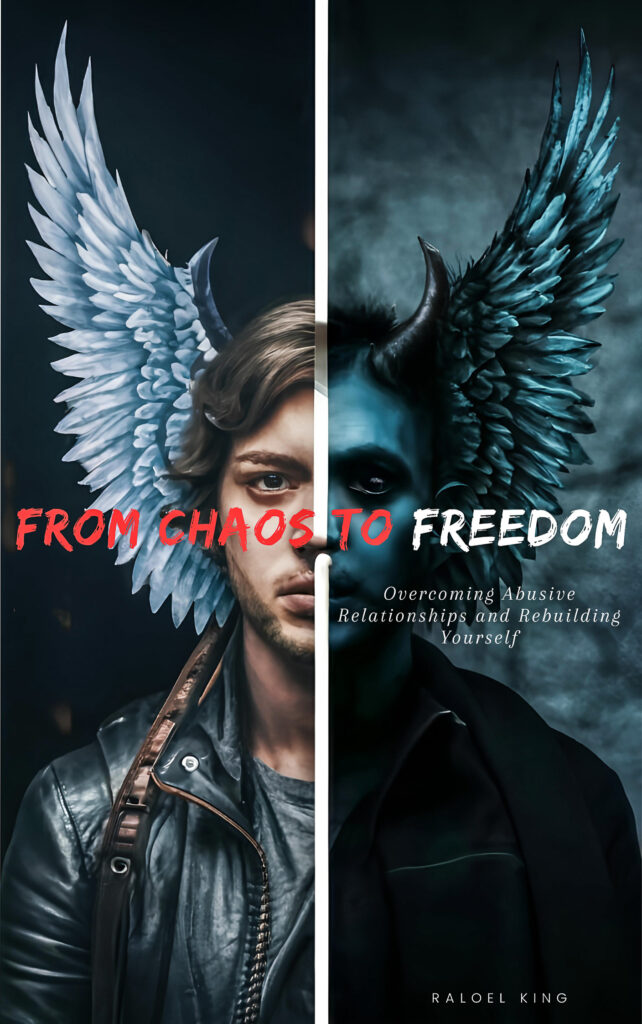From Chaos to Freedom
Overcoming Abusive Relationships and Rebuilding Yourself
It’s an e-book for all genders. On the road from chaos to freedom, finding the courage to leave an abusive relationship is only the first step towards rebuilding and personal flourishing. This e-book is a compassionate and inspiring guide for those in search of a life free from abuse and full of self-love.
Throughout the pages, you will find empowering strategies and the wisdom you need to free yourself from the emotional shackles that have imprisoned you for so long. You will discover that you are not alone in your journey and that there is a supportive community ready to reach out and help you find your way.
We invite you to look inside yourself, confront your fears and rebuild the foundations of a new life. You will learn to identify toxic relationship patterns, nurture your self-esteem and set healthy boundaries. Most importantly, you will discover that you deserve to be loved, respected and valued.
Although the road may be challenging, the freedom that awaits you on the other side is a priceless reward. You will be able to embrace your true essence, flourish in genuine self-love and build relationships rooted in respect and reciprocity.

Recognizing toxicity
In this chapter, we’ll discuss the common signs of a toxic relationship, from verbal and emotional abuse to manipulation and control. We’ll also explore the negative impact these relationships can have on a person’s mental and emotional health. Learning to recognize toxicity is the first step in beginning the process of healing and liberation.
Strengthening self-esteem
A toxic relationship can erode a person’s self-esteem, leading them to doubt themselves and their abilities. In this chapter, we’ll cover strategies for strengthening self-esteem and rebuilding a positive self-image. We’ll explore self-affirmation techniques, self-care practices and the power of therapy to help regain lost confidence.
Setting healthy boundaries
A toxic relationship often involves the constant violation of personal boundaries. In this chapter, we’ll discuss the importance of setting healthy boundaries and learning how to communicate them assertively. We’ll cover strategies for protecting yourself emotionally and how to say “no” effectively, creating a solid foundation for future relationships.
Seeking help and support
Getting out of a toxic relationship can be an emotionally draining and lonely challenge. In this chapter, we will discuss the importance of seeking help and support during this process. We’ll explore different resources available, such as therapists, support groups and trusted friends, as well as strategies for dealing with the loneliness and isolation that often accompany this journey.
In this eBook you’ll be on your way out of a toxic relationship and begin to heal the emotional wounds. Remember that you deserve to be happy and have healthy relationships. Breaking free from toxicity is a challenging process, but with determination and support, you can rebuild a full and meaningful life. This book is your guide to begin that journey.

Excerpt from the book:
“Verbal and emotional abuse
A toxic relationship often involves words and actions that are hurtful and abusive. These forms of abuse can include insults, humiliation, emotional manipulation and blackmail.
Verbal abuse is just as violent as any physical act,
because it destroys a person’s self-esteem and sense of identity.
Verbal abuse involves the use of derogatory, humiliating, threatening or offensive words, expressions or language to control, manipulate and emotionally harm another person. It can include insults, name-calling, constant criticism, ridicule, verbal threats and other forms of aggressive verbal communication.
Although verbal abuse is not physical, it is just as destructive and damaging. It affects the victim emotionally, undermining their self-esteem, self-confidence and sense of identity. Abusive words can make the victim feel devalued, worthless and inferior. This can lead to mental health problems such as depression, anxiety, low self-esteem and even suicidal ideation.
Verbal abuse can also have a lasting impact on the victim’s life, affecting their ability to relate in a healthy way to others, set personal boundaries and trust themselves. It can create an environment of fear, insecurity and emotional isolation, where the victim feels they cannot express their opinions or truly be who they are.
It is important to recognize that verbal abuse is a form of violence and that no one should tolerate or justify this behavior. Often, verbal abuse is a sign of a wider abusive relationship, which can also include physical, sexual or emotional abuse.
In the context of abusive violence in a relationship, it is essential that the victim seeks support and assistance to get out of the situation. This may involve seeking help from friends, family, mental health professionals or organizations specializing in domestic violence.”
